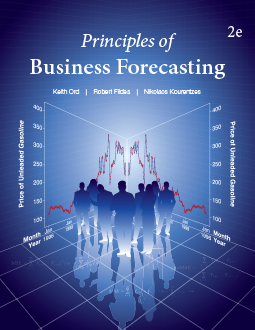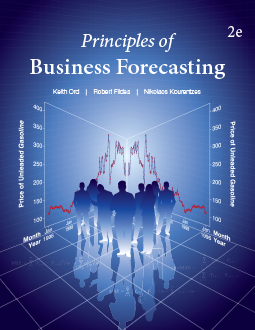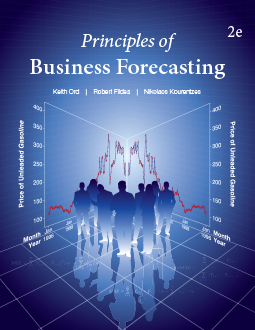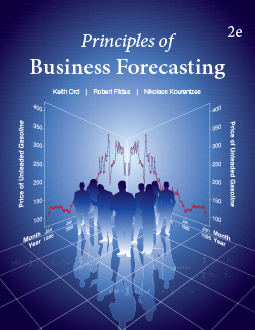
Part II: Principles of Business Forecasting: Advanced Forecasting Methods
Principles of Business Forecasting 2ed can be purchased as a complete textbook OR separately in three individual sections. The sections are only available as ebooks.
This second edition of Principles of Business Forecasting by Keith Ord, Robert Fildes, and newest author Nikolaos Kourentzes serves as both a textbook for students and as a reference book for experienced forecasters in a variety of fields. The authors' motivation for writing this book, is to give users the tools and insight to make the most effective forecasts drawing on the latest research ideas, without being overly technical. The book is unique in its design, providing an introduction to both standard and advanced forecasting methods, as well as a focus on general principles to guide and simplify forecasting practice for those with little or no professional experience. One of the book’s key strengths is the emphasis on real data sets, which have been updated in this second edition. These data sets are taken from government and business sources and are used throughout in the chapter examples and exercises. Forecasting techniques are demonstrated using a variety of software platforms beyond just “R”, and a companion website provides easy-to-use Excel® macros that users can access to conduct analyses. Another important innovation in the second edition is the tutorial support for using open-source R programs, making all the methods available for use both in courses and practice.
After the introductory chapters, the focus shifts to using extrapolative methods (exponential smoothing and ARIMA), then to statistical model-building using multiple regression. The authors also cover more novel techniques including data mining and judgmental methods, which are gaining increasing attention in applications. The second edition also offers expanded material on data analytics, in particular neural nets together with software, and applications that include new research findings relevant and immediately applicable to operations, such as hierarchical modeling and temporal aggregation. Finally, the authors examine organizational issues of implementation and the development of a forecasting support system within an organization; relevant to every manager, or future manager, who must make plans or decisions based on forecasts.
Please take a moment to review the companion website for additional content in the Appendices (Basic Statistical Concepts, overview of Forecasting Software, and Forecasting in R: Tutorial and Examples) the many data sets referenced in the chapters, macros such as the Exponential Smoothing and Trend Curve Marcos and Time Series Neural Network Analysis and student study materials.
Keith Ord
Keith Ord is Professor Emeritus in the Operations and Information Management group at the McDonough School of Business at Georgetown University.
He completed his graduate work at the University of London, and held faculty positions at the Universities of Bristol and Warwick before moving to The Pennsylvania State University in 1980, and then to Georgetown University in 1999.
Keith’s research interests include time series and forecasting, spatial modeling and the statistical modeling of business processes. He is a co-author of the 2008 research monograph, Forecasting with Exponential Smoothing: The State-Space Approach,and also co-authored Kendall’s Advanced Theory of Statistics.
He has served as an editor of the International Journal of Forecasting. Keith is a Fellow of the American Statistical Association, the International Institute of Forecasters, and the Royal Statistical Society.
Nikolaos Kourentzes
Nikolaos Kourentzes is a Professor in the Skövde Artificial Intelligence Lab at the University of Skövde and in the Department of Management Science at Lancaster University Management School.
His background began in Strategic Management, but he quickly changed his interests to Management Science, earning a Ph.D. from Lancaster University in forecasting with neural networks.
Nikos’ primary research focus is modeling uncertainty in a business forecasting context, whether that concerns model specification and selection, or ways to make forecasts more reliable and robust. His research addresses forecasting issues of aggregation and hierarchies, model combination, promotional modeling, and supply chain collaboration.
He has published multiple forecasting-related open-source packages for R, in his attempt to bring current forecasting research to practice. Nikos is on the editorial board of the International Journal of Forecasting.
Robert Fildes
Robert Fildes is Distinguished Professor in the Management School, Lancaster University, Director of the Centre for Marketing Analytics and Forecasting.
He graduated from Oxford and the University of California, and went on to write one of the early forecasting texts. In 1981, with Spyros Makridakis and Scott Armstrong, he founded the International Institute of Forecasters, which has organized conferences for nearly 40 years and, more recently, workshops on all aspects of forecasting.
Robert was co-founder in 1985 of the International Journal of Forecasting, the premier academic forecasting journal.
His current research interests are concerned with the comparative evaluation of different forecasting methods, particularly applied to retailing and the implementation of improved forecasting procedures and systems: in a nutshell, getting improvements into practice.




